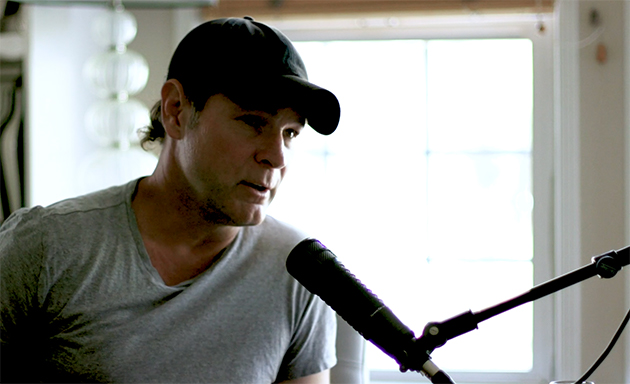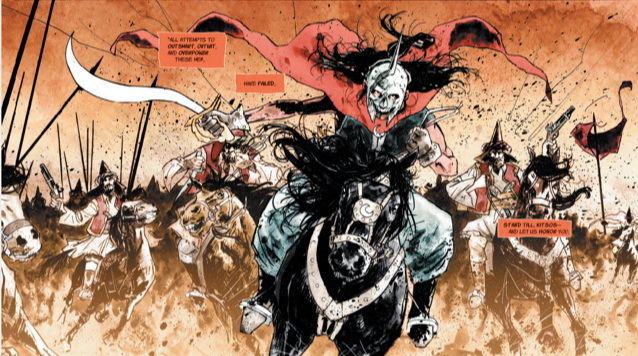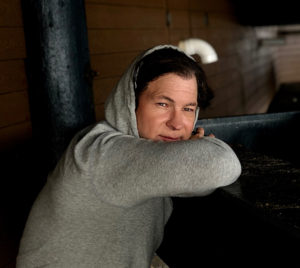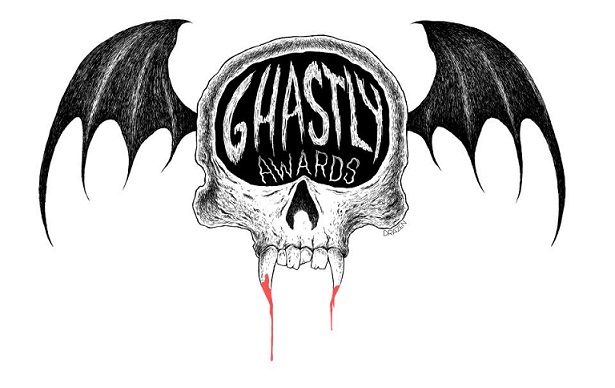As an actor, writer, and director, Chris Jaymes has spent a fair portion of his life working in the film industry. With Sons of Chaos, the multi-talented creator has added the historical fiction graphic novel to his repertoire in grand style. Set during the Greek Revolution, SoC is a heartrending telling of the story of Marcos Botsaris, hero of the revolutionary forces who suffered greatly at the hands of Ali Pasha, the conniving regent who presided over much of Greece on behalf of the Ottoman Turks. I recently had an opportunity to connect with Chris and discuss the history of this particular project, from genesis to fruition. He offered tremendous insight into his personal creative process, his passion for history and storytelling, and his intention for the audience of Sons of Chaos.
ComicAttack: For the benefit of our readers who may not be familiar with your work, please share a bit of your professional background.
Chris Jaymes: From my teens I’ve been working in some manner in the entertainment industry and the past decade more philanthropic, make the world better type of stuff has found its way in there. Early on I worked primarily as an actor and toured with some bands as a piano player. Started writing screenplays and directed a small film that won a bunch of film festivals which pushed me further into writing and directing. At this point, I still do those things but I also spend a lot of energy on ocean conservation and solutions for marine mammals in captivity.
CA: What would you say inspired your shift to working in print, particularly comics? Were you always a fan of the medium?

CJ: As a kid I was obsessed with comics and sort of misplaced the majority of my 5th and 6th grade education because of it. That said, I never had the intention of making comics or even considered it honestly. It was only after I had started writing the screenplay for a film version of Sons of Chaos that the thought entered my mind in a real way. It was the first time I was writing something that actually made sense for the medium. Prior to that, I had always written comedies and TV pilots, most of which wouldn’t make an obvious conversion, but the scope of Sons is pretty epic and it made sense to push in this direction. Especially after the years of work that went into researching 19th Century Europe and the vats of paintings and sketches I compiled of the period. And the concept of creating a massive panoramic visual telling of the events and the idea of having an actual tangible piece of physical material became extremely appealing. And then came the self-imposed psychological abuse of actually doing it. Hah!
CA:Was the Sons of Chaos story your conception from the very beginning, or was it a project that you signed on to write?
CJ: The initial concept came from conversations with one of my best and most insane Greek-American friends, Nick Lambrou, who knew I was a writer— knew I had made a few movies so he started pushing this war on me, saying it had never been told much outside of Greece and the idea of telling a war story was appealing, especially one about an underdog driving revolution to fruition in recent history.
CA: How long have you been working on it?
CJ: Long enough to have earned a doctorate in most anything. Initial discussions began almost 10 years ago. Many other projects happened along the way, but the actual time focused on the creation of the book upon defining the story and research was about three to four years.
CA: What attracted you to a historical fiction project versus something flashier and more contemporary?
CJ: The older I get the more I’m drawn to stories about real things or actual events. Stories that are absolute fiction or fantasy, or superhero-superhuman driven are becoming harder for me to engage in, both watching and writing. Of course, I enjoy it when it’s good, but there are so many things I want to learn about and years just keep passing. That’s another thing that has happened as I’ve gotten older— I’m stuck thinking about purpose much more now. Doing things with some sort of purpose, more so than just entertain. Not sure that changes the reader’s experience necessarily since it’s all pretty much fiction, even when it’s not. Probably something I should think through instead of figuring out while bantering at your expense. Hah!
CA: What was your process like for researching the people and locations that would become part of the narrative?
CJ: Initially, I acquired every possible resource about the Revolution that was written in English. Deciphered the biased telling which was often conflicting and created books and timelines surrounding every person, location and event for decades on both sides of the Revolution. Once I had a base understanding, traveled around Greece aggressively searching locations and getting a visual understanding of the geography. And searched museums and books for every visual representation of the period, from sketches and paintings to weapons and artifacts. Basically, a self-induced, amphetamine-paced, immersion into the period and events.
CA: What attracted you to Marcos Botsaris as the protagonist, and was his story always your main focus, or were you more intrigued by Ali Pasha?
CJ: Marcos was an interesting starting point because he was born into a position of chaos, based on his family and village. As opposed to certain, more stabilized regions, Marcos grew up in an area that was often under siege and ongoing battle was ingrained into your day-to-day existence. Ali Pasha eventually took his village and slaughtered people, so tying Marcos’s beginnings into the arcing story which follows the revelation of Ali’s agenda was a good starting off point. And yes, the intrigue of Ali Pasha is hard to overlook and obviously the throughline of the story I chose to tell. I mean… maybe not the most obvious if you haven’t read the book.
CA: What points of the narrative were you most required to compromise in terms of historical accuracy versus entertainment value and conforming to the medium?
CJ: Though there are many elements of Marcos’s story that are based on truth, after the introduction of his life and village, his character serves as a conduit to introduce numerous key events throughout the uprising. There are numerous devices implemented within the telling to reframe circumstances, for instance— after Ali Pasha captured Marcos’s village, he and the survivors went to the Ionian Islands and trained with British military. In a sense, Marcos’s psychology was imprisoned by the actions of Ali, even to the very end when Ali ordered his father killed. And to experience the inner workings of Ali Pasha, instead of island life I placed Marcos in the dungeons of Ali’s Palace. Whether the reader sees it as a psychological prison or a physical prison is all the same, but one is fiction. At this point, Marcos becomes somewhat of a surrogate host to lead us through the Revolution.
These decisions are all made for various reasons. To fit the medium you must work within certain parameters. Page count being the primary factor, but the amount of characters and locations must also be restrained to a level that readers can follow. Especially when the names are foreign and difficult to retain. At a point, you have the historic information and the format parameters sort of figured out, and then you basically throw everything away and put the story first. Everything else becomes irrelevant if you don’t tell an engaging story.
CA: Were there any characters that you had trouble writing or conceiving thematically?
CJ: In moments they’re all challenging. Biggest challenge is finding the line to avoid polarizing characters and creating one-sided “bad/good” guys, as opposed to humanizing all sides and creating layered characters. The Muhktar character plays on that outer edge as many of his actions are just so awful, but to expose a vulnerability within his equation that doesn’t necessarily make you root for him, but maybe you relate to certain challenge that he faces and at least find the human in there. That’s where the challenge lies and what I’m striving to find.
CA: How did you resolve consolidating what had to be hundreds of real life participants and distilling their actions and relationships into something more immediately palatable?
CJ: Once the story locked into the events set off by the attacks on Souli — the slaughter of Marcos’s people— and Ali’s overall agenda this became the framework. And by process of elimination, certain key events and battles made the most sense to highlight, at which point instead of introducing all the individuals for each incident, Marcos carries out certain events and takes on the lives of certain participants for the sake of time and storytelling. And this way you contain the storytelling to your key characters regardless of the event.
CB: What was something you learned about the material that truly surprised or horrified you while conducting your research?
CJ: That only moments ago in our history, not even 200 years ago, we were this brutal. It was moments ago we— as humans— were putting heads on stakes, hanging people on populated streets from tree branches, killing men, women, children, and animals based on primarily false ideas sold to the populations. And I can see how close we still are to some of these behaviors with our current trend of polarization and de-unification of one another around the world.
Most of us have grown up in an entitled world of comfort and abundance, something that has only existed for a short period of time. The generations of those who experienced the realities that come with a world at war are mostly dead or at least very close to it. As they disappear, so does the wisdom and desire to avoid recreating a dismantled world based on isolationism and border walls.
CA: What was something you learned about yourself working on this project that surprised you?
CJ: That spending too much time alone is dangerous to my existence. Haha… Both mental and physical. Especially when you’re living inside psychologies that carry out awful tasks on large amounts of humans for months at a time. But in actuality, as much as that can be a grind, it’s sort of the most engaging part as well. Breaking down the equation of individuals and searching to make sense of their actions and justify their behaviors is probably the part that drives me, or keeps me engaged in what I do. The science of you and I and what we are and why is really the thing that interests me most and keeps me learning and hoping we can be good in the larger picture.
CA: How did Ale Aragon become attached to the project?
CJ: I was exposed to his work and through an introduction we started talking. Without him I would have collapsed far more often. He brought it to a level that exceeded anything I could’ve conceived.

Art by Ale Aragon Colors by Hi-Fi Design
CA: How was the process of writing for an artist, and for a graphic novel format, different than scripting for film and television?
CJ: Excruciatingly different. Story is the same, but format is absolutely incomparable. Conveying a sequence that lives and breathes in your mind into a few panels with a few short bits of text is an entirely different discipline. The discipline of economizing words and defining key image points without losing the imagined nuances that bring life to the story living in your mind is extremely confining. People seem to enjoy comparing it to a storyboard for a movie, but it’s absolutely not that. When you storyboard a shoot you can stretch each moment and cover every beat. It’s fluid and expansive, as opposed to finite and immobile. The rewrite process of a screenplay or a TV pilot you continue adjusting as the production evolves and continue to rewrite during the shoot and post-production. With the book, I would rewrite to fit the artwork and then constantly adjust and refine. At times, the story element wasn’t clear enough on certain pages or panels, but it was too late to have Ale redo or add pages— felt like my brain was getting crushed by a clamp, at times for days— but it stimulated moments to be reimagined, by force. And sometimes for the better. The finality of the book weighs heavier than a script. The book sits there to be judged forever. Movies and TV shows barely get a second viewing. Or even a first.
CA: Would you be inclined to take on another project in a similar genre?
CJ: Definitely. More and more I’m drawn to stories that expose situations from our past in a way where the meaning is realigned, ideally in a manner that expands awareness and helps or inspires us to be better in some way. And it seems there are plenty of stories surrounding the agenda of leaders waiting to be exposed.
CA: My understanding is that the war depicted in SoC had far reaching implications, particularly in Europe. Would you consider a historical fiction series with IDW or another publisher?
CJ: Of course. If it was surrounding a subject matter that I could accept obsessing about in a thoroughly unhealthy manner for awhile, I would be up for it.
CA: Are you interested in adapting SoC into a film or other medium? Is that something you would intend to take on personally?
CJ: I’ve already written a screenplay and a sequence of TV episodes, so the adaptation has been underway for awhile. Meetings with companies to collaborate with has only just begun, so we shall see where we end up. Definitely an exciting thing to see the various stages of the past decade begin to take next steps as the evolution of the project continues to grow.
CA: It is often considered a negative trope, particularly in comics, to use women as a compelling or motivational plot device for male characters (See Women in Refrigerators). Do you feel working from a historical basis insulates SoC from that kind of criticism?
CJ: I don’t think working from a historical basis should necessarily be justification to insulate a project from telling a story in a certain way ever, or influence the criticism. Whether it’s from history or yesterday, you should tell the story that you feel serves the purpose of the story. That said, without revealing story details, there is a bit of a deceptive element within the female relationship that I think enhances the depth of Ali Pasha’s maniacal thoughtfulness that makes it a better story.
CA: Is the argument against such tropes an overly reactionary response more concerned with optics that narrative consistency, or do you feel these depictions can be harmful or even potentially indicative of “lazy” storytelling?
CJ: Lazy storytelling can’t be fixed by following trends or imposed industry norms or parameters. When a story is executed well, it could implement the most basic, cliche elements from storytelling structure, break every unwritten rule, say all the “wrong” things and still win if the writer did something thoughtful.
CA: We often find bleak and demoralizing brutality in looking back and examining historical conflicts. Do you feel it is necessary to depict these occurrences with an unflinching authenticity?
CJ: No. I think you should convey the elements in a manner that reflects the story you’re telling executed in a tone that serves that specific story. Brutality comes across pretty easily, pretty quickly. I think we get the point pretty rapidly and unless you are intentionally creating a vat of discomfort for the audience to live in for a purpose, a little goes a long way.
CA: Would you say that authenticity in that regard can serve as a warning to current and future generations, or that it is wholly gratuitous and an edifying experience can be provoked without it?
CJ: Unfortunately, I think we are pretty numb to the presentation of violence. We’ve had decades of brutality delivered to us in every form, from TV shows, movies, super heroes and video games. There is very little connection to human association and the taking of lives when kids are playing Call of Duty or watching The Avengers. For better or worse, we have in many cases disconnected the experience of watching death from the reality of a life being taken away, and until you are on the other end of it, it seems to mean very little to the viewer— in most cases. The presentation of raw human brutality built into connected, empathetic, humanized storytelling can have an awakening effect at times, and can stimulate a sense of compassion. It’s a nice idea to think we could learn to be better people by taking in these fictionalized or recreated experiences through movies and books and television. I’m sure it happens, but I’m not sure how much.
CA: Ultimately, what do you want readers to take away from Sons of Chaos thematically? Should it be more than an entertaining experience?
CJ: The entertainment element is important to keep the reader engaged, but ultimately the goal is always to inspire something, be it an expanded awareness or a hypothetical voyeuristic opportunity to place yourself into situations that you probably will never experience and wonder how you might deal with extreme circumstances. There are multiple themes running throughout Sons of Chaos and situations exposing the horrific treatment of humans, and the capacity individuals are willing to go to carry out self-serving agendas at the expense of others. Ideally, the reader has an engaging experience while seeing more than just comic book pages, that this behavior amongst humans, and especially from our leaders must no longer be accepted. That as a people, we are responsible to question their agendas with force and inhibit them from leading us to harm.
CA: Finally, just to wrap up, as a kind of personal touch for our audience:
- What are you reading?
CJ: At the moment, my friend’s book that just came out. It’s called Civilized to Death by Chris Ryan.
- What are you watching?
CJ: A documentary about Leonard Cohen and the woman he could never fully be with. Marianne & Leonard: Words of Love. Also just watched a great documentary called The Game Changers about plant-based diets in sports creating the best athletes.
- What are you listening to?
CJ: At the moment, I’ve been listening mostly to audiobooks. Been re-listening to the book Sapiens by Yuval Noah Harari.
We at comicattack.net would like to thank Chris Jaymes for taking the time to share his thoughts and answer these questions for our readers. If you would like to know more about Sons of Chaos please check out my review. The impeccable hardcover edition of Sons of Chaos is available now online and at comic book retailers.
Christian Davenport
cable201@comicattack.net


